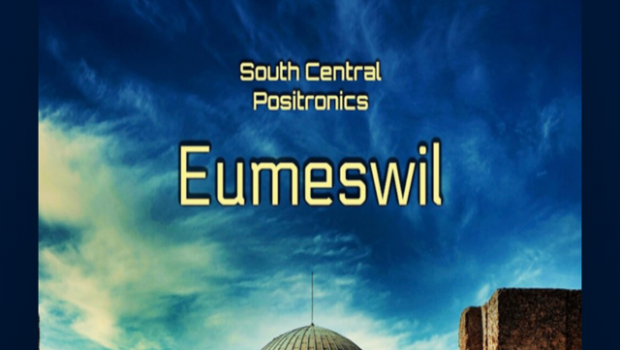South Central Positronic Presents Eumeswil
Michele Sarto (“Mike” to those closest to him; other people just can’t pronounce the name properly) is best known for his alias of Kish Kollectiv he also is known as South Central Positronics. His releases under this guise are more SciFi related but not your run of the mill science fiction but more along the lines of Dime Novel Pulp Fiction tradition. It’s a SciFi theatrical musical journey.
The latest release is best put in the musician’s own words: The title and inspiration for the second South Central Positronics release comes from a late seventies novel by the German author and philosopher Ernst Jünger. Jünger was a fascinating and sometimes controversial figure who had a very long and interesting life that included service in two world wars and a keen interest in such disciplines as botany, zoology and biology. He also became a noted entomologist. His 1939 novel “On the Marble Cliffs” has been interpreted as a critique of the then incumbent National Socialist regime, of which Jünger was no admirer.
The setting of “Eumeswil” is a North African city-state of the same name, in some post-apocalyptic future that is only tangentially referenced. The main protagonist and narrator of the novel is Martin Venator, a historian who enjoys a position and privilege in the outer edges of the ruling dictator’s (known simply as the “Condor”) circle. Some of the technology described seems to foreshadow such modern features as the smartphone, the internet and even genetic engineering. The pragmatic Venator has found a way to exist within the framework of an authoritarian regime while maintaining a high degree of individual and intellectual freedom, the embodiment of an archetype Jünger labelled the “anarch”. In many ways, it is not an easy book; such was the level of Jünger’s erudition, the modern reader finds himself or herself constantly turning to Google to understand some of the historical, cultural and philosophical references…at least this one did. It is, however, worth the effort.
Musically, the album features a sequence of instrumental pieces that draw upon 1990s electronica, hip-hop and trip-hop styles, such as the Eurodance-influenced “Luminar”, the seductive late night vibes of “Latifah” and the eerily lilting and wintry-sounding “Hyperboreans”. Each loosely references various concepts and characters from the novel, culminating in the climactic nine minute monster, “Forest Passage” (incidentally also the name of one of Jünger’s earlier works), reflecting the final traversal of Venator (along with benign dictator the Condor and his trusted henchmen) into the wild woodlands at the edges of the territory beyond Eumeswil.
Born of Italo-Celtic stock into a slowly rusting northern England in the throes of Thatcher-era de-industrialisation, the young Michele Sarto (“Mike” to those closest to him; other people just can’t pronounce the name properly) was bitten by the horror bug early. After having been “encouraged” to sit through an uncut version of Lucio Fulci’s surreal schlock masterpiece “City of the Living Dead” at the age of 6 by mischievous elder cousins, a lifelong fascination with the darker side of fiction was born. Equally haunted and excited by aftermath images of reanimated corpses, horrific “skull-crush” kills and a young woman literally vomiting out her innards, another element of that particular production was to make an indelible impression on the young Sarto; the maestro Fabio Frizzi’s masterful synthesizer-driven score.
https://twitter.com/SPositronics
Tweet










































